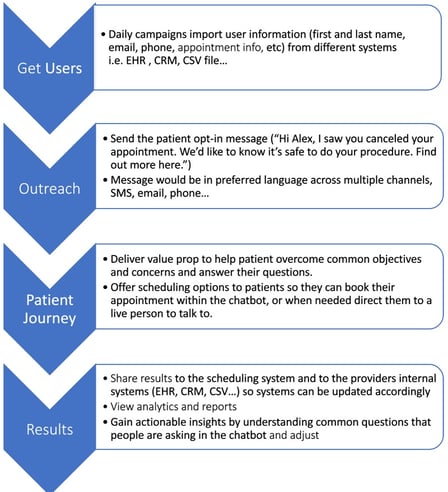
Getting Your Hospital Back Online In the Midst of COVID-19 with Virtual Assistants
The healthcare industry presents unique complexities and brings about a wide variety of barriers that healthcare organizations and providers must overcome to implement the most effective care plans for their patients. One key example of these barriers and obstacles is the poor quality of many existing communication channels that providers currently use to support patients virtually in managing medications, answering questions, rescheduling appointments, and more. Now, within the context of the COVID-19 pandemic, these challenges have been heightened and many more have appeared.
Canceled Procedures
Since the beginning of 2020, healthcare organizations have seen an unprecedented amount of health procedure cancellations, ranging from regular checkups like annual physicals to previously scheduled specialty appointments and surgeries.
In a study of nearly 510 hospitals from 60 countries, it was estimated that 28.4 million elective surgeries were postponed or canceled, just in that initial 12-week period. There are numerous factors contributing to this data including patients’ fear of contracting COVID-19 as healthcare facilities are seen as high-risk spaces and government intervention delaying elective surgeries. On the provider side, there was simply not enough time (or resources) to keep up with all of these procedures and non-COVID related visits.
Today, as we discover more about COVID-19 and ways to avoid and prevent it, healthcare facilities have taken extra steps to safely and effectively provide care during this time. Patients are often unaware of these precautions that have been implemented, so individuals are still hesitant to reschedule potentially vital visits or procedures.
From that study of 510 hospitals worldwide, researchers believe it could take almost a year for some countries to catch up with postponed or canceled surgeries, even if they start operating now at a 20% increase in surgical patients. To begin to make up for this lost time, healthcare organizations need their elective patients to reschedule missed appointments and continue coming in for new ones - and this needs to happen soon. These delays and cancellations have significantly negative consequences on the financial well-being of healthcare organizations, but also on patients' health.
Impact on Patient Health
With these delays in elective surgeries and procedures, many patients are at a higher risk of adverse events. It is important to note that there is a range of elective procedures, from cosmetics to tumor removal and transplants. There has been significant disease progression in many treatable cases or cases in which symptoms can be managed. Providers are also witnessing a delay in detecting new or worsening conditions through decreased routine screenings and visits, which in the long-term could be detrimental to a patient’s health.
Of those 28.4 million missed surgeries, roughly 2.3 million were cancer-related. Another study conducted in the UK analyzed 32,583 patients with a number of different types of cancer. Their findings predicted an additional 3,921 - 3,621 deaths within five years due to delayed detection or treatment of the disease. To avoid that number from growing as the pandemic continues, patients need to schedule and rebook their appointments in scenarios where and when it's safe to do so.
How Orbita Can Help
As safety measures are implemented to welcome more patients back for elective procedures and regular visits, the challenge then becomes how to efficiently communicate to all of these people why it's safe to come in - and nudge (encourage) them to rebook.
The process to manually reach out to each patient would take a significant amount of time and effort. It requires the compiling of prior information such as who the patient was going to see, at what time, and for what procedure. Then, they have to successfully reach the patient and have them rebook, and when unsuccessful, track their attempts and carry out additional outreach. In the time it takes for one person to reach out to a patient. OrbitaCONNECT could engage with hundreds by using the nudge theory to initiate conversations with patients around rescheduling their appointments, treatments, and procedures.
The first step of engaging the patient is to push a text to their mobile device with an explanation of why it's safe to come in for an appointment now, with a link to a conversational chatbot.
This nudge is only the beginning of the conversation, and the chatbot will drive the patient down a conversion funnel to ultimately reschedule their appointment. Once engaged with this virtual assistant, the chatbot will assess why the patient initially canceled their appointment (most likely due to concerns surrounding COVID-19 and medical distancing), but there is also a slew of other potential reasons from forgetfulness to insurance questions to a lack of transportation.
While the conversational assistant is busy discovering the reason behind the patient's cancellation, it can lead the patient down a path to provide a solution to many of those issues and also collect analytics to improve future engagement.

If a patient is unsuccessfully engaged by the initial SMS, they will then receive a phone call, which can also be followed by an email to prompt them to reschedule. This cascading method of outreach increases the chances of engagement and improves rescheduling rates. Another distinguishing feature of the Orbita platform is its multilingual capabilities, so it can engage with patients in their preferred language, improving equity and access.
While this chatbot assistant can answer most questions, it can also provide the option to speak with a live call center representative, if preferred. This provides another channel to continue the conversation and easily schedule that next appointment. Even if a patient chooses this path to rebook, the chatbot simplifies this process because it has already completed the initial outreach, engaged the patient, and collected important initial data.
The advanced capabilities of a virtual assistant empower healthcare organizations and providers to turn a lost opportunity for care into a connection point while minimizing the administrative efforts and burdens required to reach out to patients. Engaging an individual with a nudge is one step, but successfully leading a patient to take action in a way that produces the desired outcome is a whole process.
The omnichannel support and conversational technology provided by Orbita’s conversational chatbots can get your hospital back online and more patients coming through your doors as the fight against COVID-19 continues.

